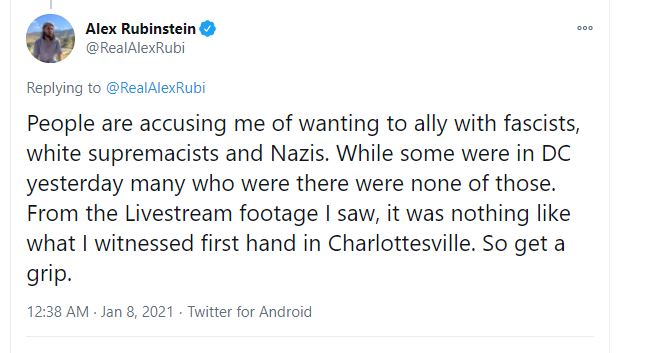So there's this thread by a dude, talking about the fascists who stormed the capitol, and it's now bothering me so much that I need to break it down, tweet by tweet.
Tweet 1. We jump right in with a "The workers are good, the elite are bad" thing. I find this simplistic and silly. The enemy, if we must call it that, is a system of power which both influences the incentive sets of a political elite and perpetuates certain values...
...these values are not unique to the ruling classes, and can be sublimated and internalised by people across society. People who are so far gone that they would storm a government building are not worth convincing, and cannot be convinced regardless.
Tweet 2. This one highlights an interesting trend which I see in many places, which is the distinction between "Nazis", and the assumed default state of "average folks". I think this distinction betrays an ignorance of how and why Nazism was dangerous, and threatened so many...
...The definition criteria used for "Nazis" tends to be an self-aware, intentional and extreme devotion to explicitly fascistic ideology. I'm not talking about the fascist undercurrents present in much of the trappings of modern statehood, I mean "has read fascist philosophy"
Problem: if we use that criteria, *most of the actual, historical Nazis do not meet it*. Nazism became prevalent and dangerous NOT because people became adherent to a particular ideology, but because a lot of "average" people did not challenge authority, for various reasons.
This is the source of the phrase "the banality of evil", a phrase Hannah Arendt coined to describe the pedestrian, dispassionate attitude coined by Nazi war criminal Adolf Eichmann.
Arendt reported that Eichmann did not seem to especially hate Jews, or indeed have any particular complex thoughts on Nazi ideology. He spouted stuff he heard from official sources, and basically did everything possible to follow along with the crowd.
Eichmann was a central figure in the most famous act of fascist violence in history, and yet he just "did his job", as he put it. He had little understanding or interest in political ideology. He was an average, quite dim person in a system that incentivised monstrous behaviour.
Tweet 3! This one is interesting, because it assumes that the people who stormed the capital had A. a particularly good reason to do this, and B. A reason to fear that they would lose anything. I don't think either of those things are true.
Some things that're abundantly clear when you look at the events of the day are that the protestors were surprised and offended at the pushback they got from authorities, and that the authorities were extremely unwilling to apply even that small amount of pushback.
White, middle-class people do not very much to fear from the police. Even white active shooters are captured alive or talked down, while black people are gunned down for nothing at all. I suggest that if these white people did have any fear, they never would have done this.
"Why would people with something to lose storm a legislative building?" They would do it if they didn't feel there would be significant consequences. And they would be right, because there wasn't for 99% of them.
Tweet 4! The main thing that interests me here is the implication that humans are rational actors, and the only reason why these people do not fight for justice is because they have not been told about it.
I think this is interesting because it assumes that the default state for a human is "leftist", or at the very least "empathetic", and that lies can cover up that inner truth. I think this is overly optimistic at best and foolish at worst.
We need to consider the possibility that these adults have been given many chances to learn about injustices, but simply do not care. "Raising awareness" cannot rectify injustices if people are aware of them already, and approve, tacitly or actively.
Tweet 5, final tweet. This is back to the old chestnut of separating "Nazis" and "average people" into two distinct boxes that don't overlap, and I think I said my peace on that. All I'll add is that many of the people present at Charlottesville were also in this mob too.
I'll end with a quote from Arendt on Eichmann: "Despite all the efforts of the prosecution, everybody could see that this man was not a "monster," but it was difficult indeed not to suspect that he was a clown...
"...And since this suspicion would have been fatal to the entire enterprise [his trial], and was also rather hard to sustain in view of the sufferings he and his like had caused to millions of people, his worst clowneries were hardly noticed and almost never reported"
Society seeks to frame those who are complicit in horrors with a unholy halo, to brand them with an unique quality of evil. The true, more upsetting truth is that almost anyone can be an Eichmann.
(Blame @thebrainofchris for triggering this outburst, btw)

 Read on Twitter
Read on Twitter






